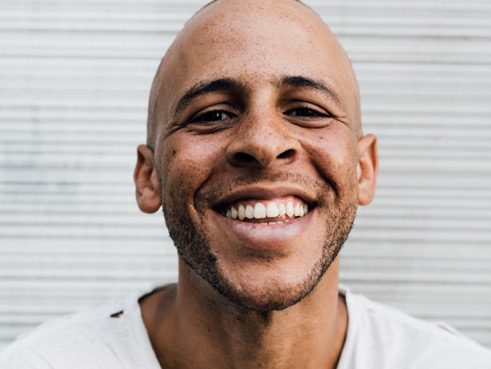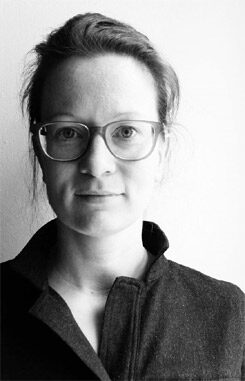German Dance Platform 2016
Neighbours, in the plural

Choreographer Will Rawls and dramaturge Sandra Noeth in conversation about identity, nation, and the German Dance Platform.
Sandra Noeth: When invited to join the jury of the German Dance Platform, my colleagues and I faced a slightly discomforting feeling towards the explicit label “German”, and questioned what this indicates and claims today. It feels kind of obsolete when looking at actual production practices in the field of dance and the performing arts. And what does it mean to maintain this overarching, national denomination in the light of current political and social realities?
Will Rawls: I visited the Venice Biennale in summer 2015 and felt that the idea of national pavilions no longer functions as it may have done at a certain point when national divisions were crucial to localising an aesthetic in order to enter an international, if limited, dialogue. The dance conversations I’m privy to are interdisciplinary and happening across borders. I don't imagine the people who are actually working in the German field experience their kind of creative growth in a very particular German way – dance happens so much by osmosis and porosity.
In the US we don't really have the ideological infrastructure to mount a US dance platform. Dance, here, still has an uneven visibility in the cultural dialogue about the arts. Also, dance-making methods across the field continue to be non-systemic in ways that resist, or just can't be, attached to a nationalised institutional programme.
Sandra Noeth: The German Dance platform was established in 1994, at a moment when questions of institution, infrastructure and knowledge circulation in contemporary dance in Europe, and their local, national and international intersections were being substantially reframed. Questions of race, gender and nationality as identitarian features have been strongly reflected in discourse since then, and still continue to influence the politics of curating, inviting and funding today. But the performativity and the physicality of the body always blur and destabilise these categories and ascriptions from the outset, when entering into the responsive and contradictory dynamics between an individual and a collective body. How can we trace these overlapping and interweaving processes when we present or watch dance from a specific place but don't "import" the specific environments in which the dance has been developed? This reminds me of “The Planet Eaters”, the project you did in the Balkans in 2013.
Will Rawls: The Planet Eaters is a duet for myself and the musician Chris Kuklis, in which I choreographed rhythms and imagery into our physical and sonic exchanges. The result was a ritualised yet fluid map of the shifting territory that binds the self to the other and tradition to the present. I feel that in some ways it's my most – and maybe only – consciously nationalistic project. Travelling in the Balkans as a dance maker and US citizen, my understanding of how folk dance operates impacted me on several levels. I went back to Serbia to study in a folk dance school. I was curious how learning these “ethnic dances” could be a destabilising rather than confirming force for me, for my identity, my agency. This is an effect that I seek from dance in general but in this case the difference between who is doing a culturally specific dance and what that dance might be trying to say becomes a schism through which to read identitarian dynamics. It felt ethical – without being politically correct – to actually go and study and not just learn from YouTube – to get into the physical ethics of embodiment and borrowing.
 Sandra Noeth
| Photo: private
Sandra Noeth: This question of responsibility also arises at the level of the production and presentation of contemporary dance when dealing with funding schemes that are bound to nationality and citizenship. For instance, I am thinking of different waves of attention around 2000, related to EU politics, that focused on different Eastern European countries, or more recently, following the political uprisings, programmes dedicated to the Arab region. Given all the positive effects of these initiatives, I would still like to point to the complex economies of money, space, visibility, and aesthetics related to them. The challenge is to raise awareness of these dynamics in our practices, and not to reduce artists and artistic work to their representational capacities, i.e. to symbolic tools for political problem-solving.
Sandra Noeth
| Photo: private
Sandra Noeth: This question of responsibility also arises at the level of the production and presentation of contemporary dance when dealing with funding schemes that are bound to nationality and citizenship. For instance, I am thinking of different waves of attention around 2000, related to EU politics, that focused on different Eastern European countries, or more recently, following the political uprisings, programmes dedicated to the Arab region. Given all the positive effects of these initiatives, I would still like to point to the complex economies of money, space, visibility, and aesthetics related to them. The challenge is to raise awareness of these dynamics in our practices, and not to reduce artists and artistic work to their representational capacities, i.e. to symbolic tools for political problem-solving.
Will Rawls: Are there particular ways in which you are working to resist that in the upcoming German Dance Platform? Ways of facilitating an artist’s own doubt about that presentational framework?
Sandra Noeth: The main decision is probably to focus on a limited selection of twelve artistic works and thereby create more space for an in-depth encounter with each of them. Also, we try to take responsibility for our decisions by becoming more visible, more tangible as a jury. To stand next to the artists – not in an uncritical way – and give them attention and take the time to enter into a public dialogue with them about how the work should be contextualized. These are small but important strategies to at least address these dynamics of inclusion and exclusion.
Will Rawls: How will you support work by artists interested in the question of identity and self-identification? In the US media, it often feels as if we don’t have any neighbours. But we also lack a sense of borders. “American experience” gets more self-obsessive as well as more universalising. But whatever our national myopia, I resent the attitude that being engaged in, or perhaps obsessed with, questions of race somehow forecloses complexity in discourse, in art. We are seeing such a visible resurgence of racial violence in our country – based on many structural factors, but one of them is the inequitable misinterpretation of black people by a dominant culture. For me, then, anything that operates on notions of visibility and representation, like the theatre, has these structurally racist stakes embedded in it. This thought perhaps leads to our shared question of abstraction. Can we afford to be abstract in our decisions and choices? Or can we allow ourselves to be abstract as artists and curators? Where does the ethical responsibility in abstraction lie?
Sandra Noeth: How do you navigate and negotiate these lines of tension in your practice?
Will Rawls: I'm both trying to say something and leave things unsaid. I'm working a lot with a hoodie sweatshirt in my solo Personal Effects. The hoodie has become a signifier of urbanity that intersects with racialised representation, in a US context, but also other contexts. However, in the solo, the hoodie is also a material and is something whose meaning and function can be poetically mobilised and stretched through the choreography.
Sandra Noeth: Are these details in your work that potentially mobilise or refer to certain US identities or communities, or something that you would adapt if you took the work on tour outside the US?
Will Rawls: I am not sure. I'm trying to figure out a poetics around the precarity of the body, which has been othered, nationalised and also abstracted.
Sandra Noeth: Along related lines, the German Dance Platform seems – unwittingly – to be entering into a difficult and strange resonance with what is happening in Germany today. Alongside the refugees coming into Europe and the reactions and networks of support towards them, there are also unbelievable acts of aggression and fear, mobilising hatred and creating images and rhetoric that we have all seen before. In relation to what you referred to as “ethical responsibility” and in the light of this European and global reality, what is the responsibility and the effect of a project called a German Dance Platform?
Will Rawls: Good question. It's a microcosm that represents the macrocosm of national borders. When European national borders are being perforated so explicitly through the power play of immigration policy, the sanctity of a "German" platform idea is called into question. For an artist, how can displacement function productively as a mode of questioning a German – or any – national posture?
Sandra Noeth: Alongside the national borders, visible, traceable, material and bureaucratic borders, there are also more immaterial borders with national identifiers. Borders and boundaries taking the form of censorship and self-censorship, equally influencing artists but also curators and institutions in their choices. That is to say, what is accepted in a national context – artistically, movement-wise, and aesthetically. What are the practical consequences of your decisions? How far can you and how far do you choose to go?
Will Rawls: Yes, this idea that you have to carry some sort of appropriate aesthetic monitor with you at all times that you're monitoring what you're making. I think being in an uneasy relationship to these kinds of power structures is a productive place to be for me. Isn’t one or another kind of unease a starting point for so many artists? How this uneasiness, or mistrust, plays out politically and aesthetically in other artists’ work, is more instructive to me than flowing smoothly through institutions.
Sandra Noeth: I am thinking back to the beginnings of contemporary dance, at the beginning of the 20th century, to projects mainly by Europeans and Americans, who would pick up oriental or African vocabulary and bring it to the West. Who is legitimised to speak, who has the right to perform, and which movements and representations belong to whom? I think these processes of the internalisation of aesthetics are still very virulent. How can we keep up the uneasy relation with these dynamics and cultivate a dance which is not so much about having answers, but that continues to put identitarian inscriptions in a destabilising or plural mode?
Will Rawls: That's an important mistrust to cultivate. I'm curating a platform in New York in 2016 – for Danspace Project. Along with Ishmael Houston-Jones, we are looking at the impact of AIDS on the dance community and the impact of AIDS on the plurality of queer performance now. We are thinking about a kind of storytelling programme engaged with remembrance and an embrace of the fiction in relation to history. AIDS led to a profound dispersion of people and archives and ideas and infrastructure and now we’re here in this moment. How do we fill the gap? Embracing fiction along with facts seems to be one way forward in seeking out of the productive, poetic modes of the AIDS epidemic—while at the same time bringing attention to its persistent presence today.
Sandra Noeth: Yes, how do you maintain narratives? And why do you maintain them? This constant need to fictionalise, to re-adapt and readjust, that also concerns the brittle idea of nation…
Will Rawls: What about providing an opportunity for the artists of the German Dance Platform to re-narrate the national platform from the inside – to tell stories about Germany, to undo the fixity of the national rubric? That would be neighbourly.
This article was produced in cooperation with the German Dance Platform 2016.
It is published simultaneously in the booklet of the Dance Platform.
German Dance Platform 2016
2 to 6 March 2016, Mousonturm, Frankfurt